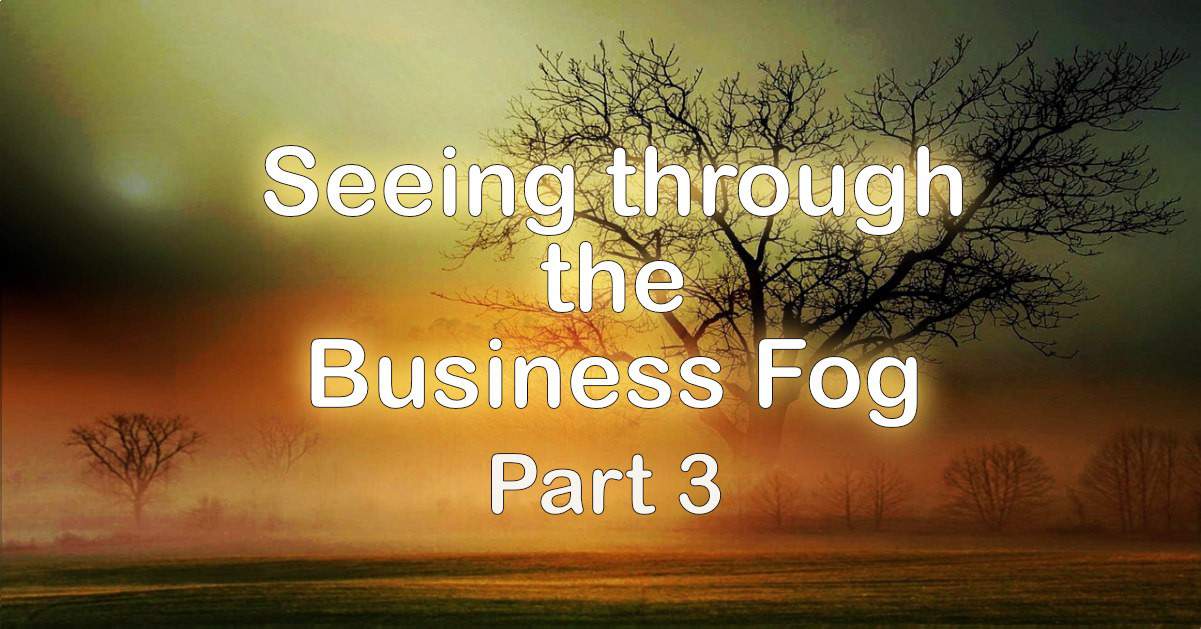We can think about having a ‘Go to person’ as a positive, the person you turn to, to get things done. As an owner, if there’s a cloud of mystery over the detail of how everything runs, fears may lurk beneath the surface: What happens if the person leaves, gets sick, or makes demands that will hurt the business? More importantly, what can you do about it?
Seeing through the business fog
This is the final part of a three-part series of “Seeing through the business fog”. This blog explores the ‘go to person’ and how to avoid being over a barrel or putting staff under undue pressure. Earlier in part-one, “Business Direction – Framework for SME Success” we looked at the importance of building a framework around your business direction. Part-two “Metrics in business – staying in control” covered the feedback loop to make sure you’re on the right path.
You have enough on your plate

As a business owner you have enough on your plate. Yet in the frantic busyness of the day job, it’s easy to sleepwalk into a business fog. That same ‘go to person’ that makes life so much easier today, can create a new set of problems tomorrow. It’s not good for the business, and it’s not good for them. So how can you avoid the pitfalls and make sure you’ve a clear pathway forward? What might the worst-case scenarios look like? See “Owner Overwhelmed with Work”.
Signed-off with stress

Your ‘go to person’ is stressed and signed off work – see “Stress at work”. There are strict instructions not to contact them for health reasons. Other staff look helpless as you scramble to save projects or safeguard vital revenue. You believe you can figure it out in time, only there’s no time. Pressure builds, staff are looking wobbly. You spend hours in meetings trying to figure out solutions. Then there are the dilemmas, do you tell customers, turn down work or cut back?
Over a barrel

There’s another scenario, one that’s even more divisive. A ‘go to person’ that keeps things close to their chest. They know the secret things that make everything work well. They want job security, so they make themselves indispensable. That’s not the only thing. Knowledge is power, and they have power over you. They have you over a barrel. Most likely, it will be very subtle, yet you’ll find aspects dictated by them instead of you. A slow death by a thousand cuts. The hero turned villain.
Clone required

The third and final scenario, deceptively sounds like a good problem to have. You’ve so much business, your ‘go to person’ is busier than ever. You quickly realize that the ‘go to person’ is the bottleneck. They’re swamped, and you need a clone. Only a clone doesn’t exist. There doesn’t seem to be anything to delegate that doesn’t slow things down. Worse, the work is slowly suffocating the ‘go to person’. They are working long hours, they don’t look well, it’s only a matter of time before they crack.
Owner fog
Our first business fog is for the owner. Owners generally know they have a responsibility to get everything done. There’s marketing, sales, product development, delivery and customer care. Then there’s all the support parts such as finance, staff, and tech. If that wasn’t enough, they also need to set the direction, stay legal and keep everything running the way it’s supposed to. That’s too much for anyone to keep in their head. What happens? Other people get involved. That’s fine, except owners can become heavily reliant on key people, and occasionally lose sight and control of what’s happening in their business.
So, what’s the owner fog. It’s when an owner doesn’t know what’s going on, because it’s in the heads of other people. When owner’s lose sight of the mechanics and controls in the business, they are unclear how it operates. It might sound harsh, but in this situation the owner has abdicated instead of delegated work. They have no effective way of governing the business. The owner is walking through a business fog.
‘Go to person’ fog

The second fog is for the person that is carrying a big part of the business in their head, and this might be the owner too. They are under pressure to perform. There’s no one else. They can’t take time out and work is bleeding into their personal life. The job has got a tight grip on them. They’re trapped. They’ve so much swirling around their head, they feel like they’re walking through fog.
Conclusion
Avoiding business fog is both possible and desirable. Owners can stay in control, gain visibility and know what’s going on. And workers, including owners, don’t need to feel overwhelmed, overworked or trapped. If you’d like help to avoid the business fog, why not take the first step and arrange to have an informal chat in complete confidence.
If you’ve found this blog interesting or useful, please ‘like’, ‘comment’ or ‘share’ so it can help others too.

